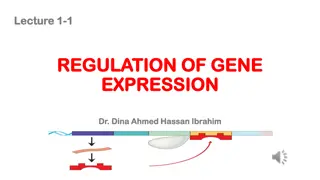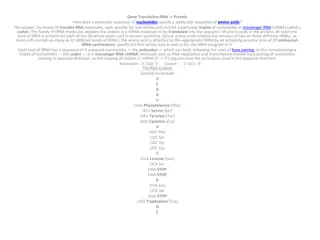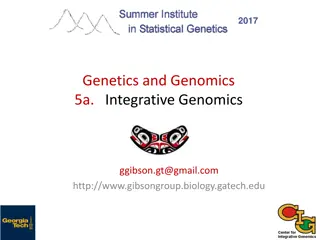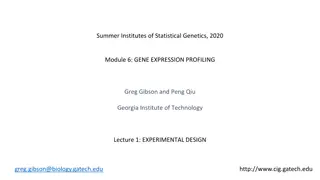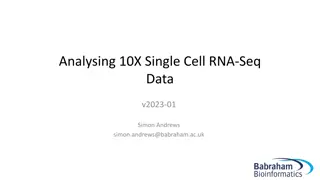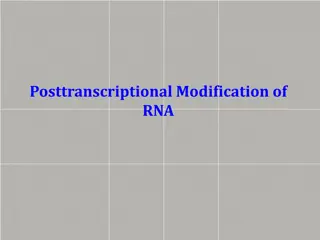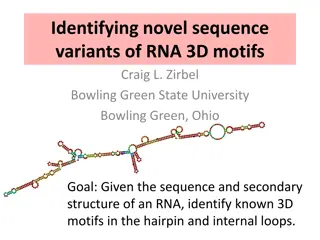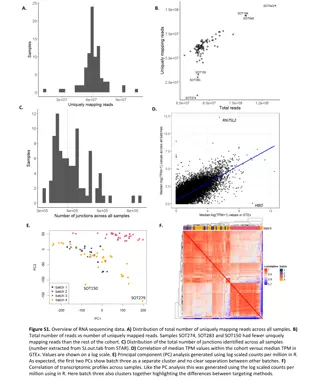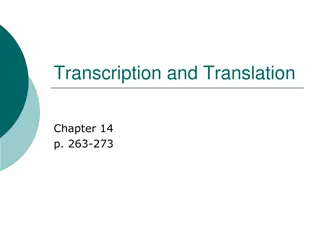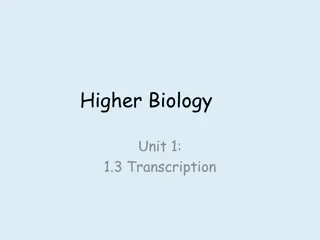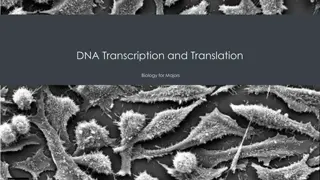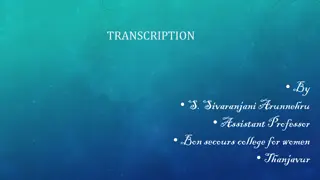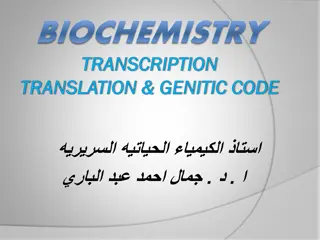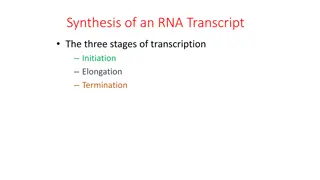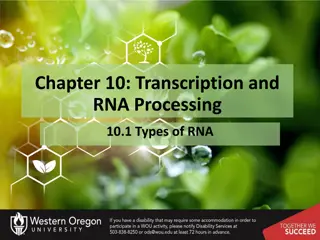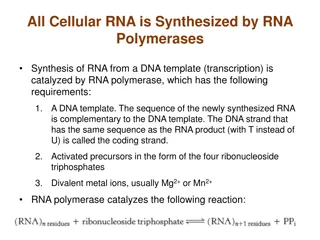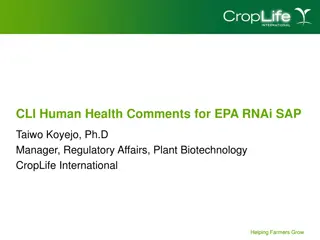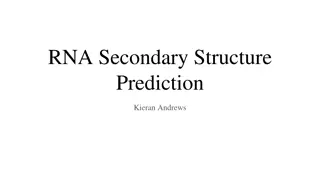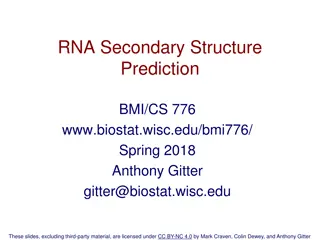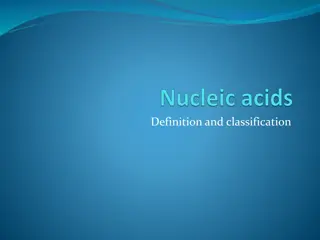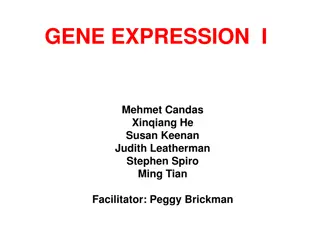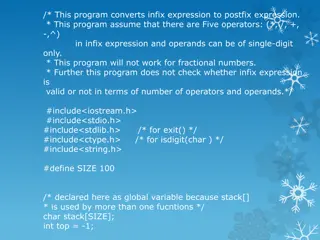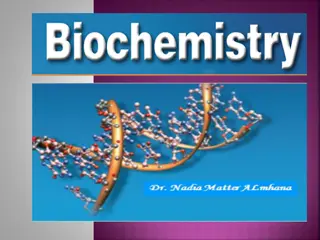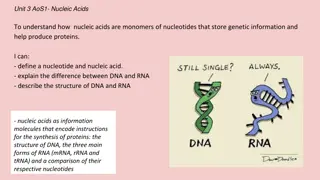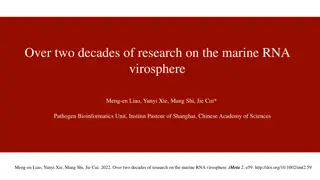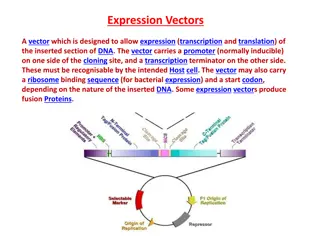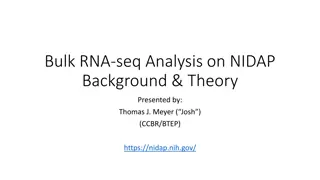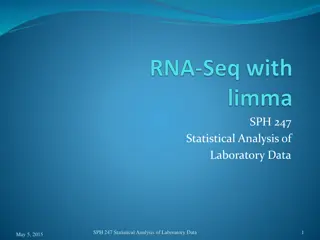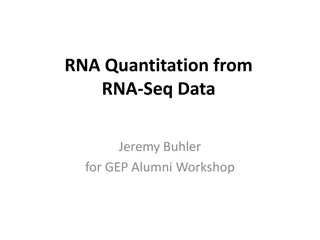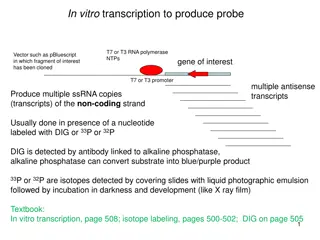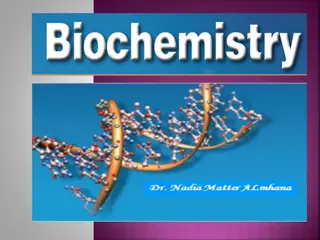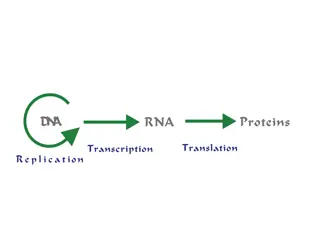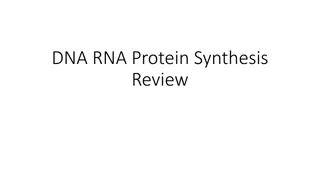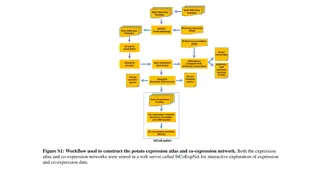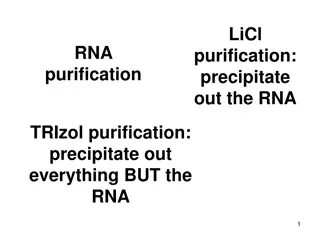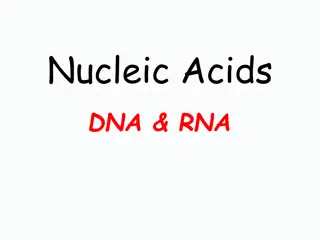Understanding Gene Expression Regulation in Prokaryotes and Eukaryotes
Gene expression is a crucial process that leads to the production of functional gene products like RNA and proteins. This article explores the regulation of gene expression in both prokaryotes and eukaryotes, covering the importance of regulating gene expression, types of regulation elements, specif
5 views • 22 slides
Understanding Gene Translation: From RNA to Protein
Gene translation from RNA to protein involves the specific binding of transfer RNA molecules to messenger RNA codons, enabling the translation of nucleotide sequences into amino acids. Each amino acid is attached to a specific tRNA through activating enzymes, and the anticodon on tRNA pairs with the
0 views • 4 slides
Exploring Genetics and Genomics in Integrative Biology
Delve into the world of genetics and genomics through the lens of integrative biology, investigating the differences between cell types, the rationale for gene expression profiling, and the analysis of differential gene expression in various diseases. Uncover the significance of gene ontology, co-ex
0 views • 22 slides
Gene Expression Profiling in Statistical Genetics Summer Institute 2020
This content provides information on the Summer Institutes of Statistical Genetics module, focusing on gene expression profiling. It includes details on the schedule, experimental design, RNA sequencing workflow, modes of bulk RNA sequencing, and RNASeq software. The content discusses crucial steps
0 views • 11 slides
Understanding 10X Single Cell RNA-Seq Analysis
This content delves into the intricacies of analyzing 10X single-cell RNA-Seq data, covering topics such as how 10X RNA-Seq works, evaluating CellRanger QC reports, dimensionality reduction techniques like PCA, tSNE, and UMAP, using the Loupe cell browser, and frameworks for scRNA analysis in R. It
0 views • 39 slides
Posttranscriptional Modification of RNA Overview
A primary transcript is the initial RNA copy of a transcription unit, subject to posttranscriptional modifications like cleavage and further alterations to form functional tRNAs, rRNAs, and mRNAs. In eukaryotic cells, pre-rRNAs and pre-tRNAs undergo processing by ribonucleases to yield mature RNA sp
0 views • 12 slides
RNA 3D Motif Analysis: Novel Sequence Variants Identification
A research project at Bowling Green State University aims to identify 3D motifs in RNA hairpin and internal loops using sequence and secondary structure information. The study focuses on finding likely sequence variants of known motifs, leveraging geometric considerations and basepair isostericity f
0 views • 28 slides
Understanding Gene Expression in Biological Sciences Course
Explore the dynamic world of gene expression with the Chunky and Chips Gene Expression Group at the University of Notre Dame. Dive into topics like transcription, translation, and cellular events influencing gene expression. Delve into real-world scenarios and gain insights into the cellular level b
0 views • 20 slides
Expression Tree Construction: Building Fully Parenthesized Expression Trees
In the process of building expression trees, nodes are inserted based on operators and operands, creating a fully parenthesized expression. The construction involves parsing the expression, inserting new nodes as tokens are examined, and linking nodes accordingly. By following the steps for handling
0 views • 17 slides
Exploring RNA-Seq Read Mapping and Quantitation
Dive into the world of RNA-Seq expression analysis through topics such as read mapping, quantitation, and the challenges faced in short-read mapping. Discover the typical parameters, design pressures, and basic ideas behind suffix tree index construction for efficient handling of large reads and dat
0 views • 19 slides
Overview of RNA Sequencing Data: Insights from Transcriptomic Profiling
This data set presents key findings from RNA sequencing analysis, including distribution of mapped reads, junction identification, TPM correlation, principal component analysis, and gene expression effects. Visual representations illustrate differences in gene expression profiles across samples, emp
0 views • 6 slides
Understanding Transcription and Translation in Protein Synthesis
Protein structure is composed of amino acids arranged in specific orders to form polypeptides. This process involves transcription of DNA into RNA followed by translation of RNA into proteins. Replication plays a crucial role in preparing DNA for cell division. The central dogma of molecular biology
0 views • 24 slides
Understanding Transcription and Gene Expression in Biology
Explore the intricate process of transcription in biology, where mRNA is synthesized from DNA to carry the genetic code for protein production. Learn about the connection between genotype and phenotype, the role of genes in protein synthesis, and the significance of terms such as RNA Polymerase, int
0 views • 16 slides
Understanding DNA Transcription and Translation in Biology
DNA transcription is the process where DNA is used as a template to create mRNA in the nucleus. This mRNA is complementary to the DNA and goes through initiation, elongation, and termination stages. RNA polymerases are essential for this process in eukaryotes. Various RNA polymerases have specific f
0 views • 47 slides
Understanding Transcription: The Initial Steps in Gene Expression
Gene expression involves two crucial phases - transcription and translation. Transcription, the first step, is the process where RNA is synthesized from DNA with the help of RNA polymerase. It begins with initiation, where the enzyme recognizes the promoter region and forms a complex with the DNA, m
0 views • 33 slides
Understanding Transcription in Biochemistry
Transcription is a crucial process where RNA is synthesized from DNA, involving complex steps of initiation, elongation, and termination. This process is regulated by specific DNA regions, proteins, and enzymes like DNA-dependent RNA polymerase. The differences between DNA and RNA synthesis lie in t
0 views • 15 slides
Overview of RNA Transcription Process
The process of RNA transcription involves three main stages: initiation, elongation, and termination. Initiation starts with RNA polymerase binding to a promoter, followed by the formation of a transcription initiation complex. Elongation involves RNA polymerase untwisting the DNA helix and adding n
0 views • 17 slides
Understanding Transcription and RNA Processing in Molecular Biology
Explore the intricate processes of transcription and RNA processing in molecular biology, delving into the types of RNA molecules, the differences between DNA and RNA, RNA polymerase enzymes, transcription factors, and the preinitiation complex. Visual aids and detailed descriptions help elucidate t
0 views • 55 slides
Understanding RNA Polymerases and Transcription Process
RNA polymerases play a crucial role in synthesizing cellular RNA through transcription, where RNA is created from a DNA template. This process involves specific requirements such as a DNA template, ribonucleoside triphosphates, and divalent metal ions. RNA polymerase catalyzes the initiation and elo
0 views • 15 slides
Safety and Efficacy of RNA in Human Diet and Agricultural Crops
RNA is a common component of the human diet, with naturally occurring RNAi mechanisms in various organisms. While staple foods contain RNA, barriers in the human body limit systemic exposure, making oral ingestion ineffective for RNAi. Studies have shown minimal bioavailability and efficacy of dieta
0 views • 9 slides
Insights into RNA Secondary Structure Prediction by Kieran Andrews
Explore RNA secondary structure prediction methods and results, highlighting the role of tRNA and rRNA in cellular RNA composition. The process involves cycling through sequence folds, scoring based on base alignments, and identifying cis-regulatory elements. Results showcase paired bases in tRNA an
0 views • 7 slides
Exploring RNA Secondary Structure Prediction in Bioinformatics
RNA secondary structure prediction is a key concept in bioinformatics, encompassing features like stems, loops, and bulges. This presentation delves into the importance of RNA beyond mRNA, highlighting rRNA, tRNA, and regulatory RNA roles. The canonical base pairs A-U and C-G shape the single-strand
0 views • 20 slides
Understanding Nucleic Acids and RNA Molecules
Nucleic acids are linear polymers composed of nucleotides, with DNA and RNA being the main types. RNA consists of messenger RNA (mRNA), transfer RNA (tRNA), and ribosomal RNA (rRNA), each playing a crucial role in protein synthesis. mRNA carries genetic information from DNA to ribosomes, tRNA transf
0 views • 8 slides
Mechanisms of Gene Regulation Through RNA Interference
Explore the intricate processes of gene expression control at the RNA level, focusing on ribo-regulation and RNA interference. Learn about mechanisms such as mRNA localization, degradation, splicing, and more, and discover the potentials of RNAi-based therapeutics through insightful learning objecti
0 views • 16 slides
Program to Convert Infix Expression to Postfix Expression
This program converts an infix expression to a postfix expression. It assumes there are five operators (*, /, +, -, ^) in the infix expression and operands are single digits only. The program does not handle invalid expressions or fractions. The provided code snippet contains functions for stack ope
0 views • 9 slides
Understanding DNA Structure and Genetic Information Encoding
Complementary nitrogenous bases in DNA, pyrimidines (thymine, cytosine) and purines (adenine, guanine), store biological information through antiparallel strands. DNA, with non-coding regions, undergoes replication and transcription to RNA for protein synthesis. Nucleic acids, DNA, and RNA are cruci
0 views • 7 slides
Understanding Nucleic Acids: DNA, RNA, and Nucleotides
Nucleic acids are essential molecules that store genetic information and aid in protein production. This content delves into the monomeric structure of nucleotides, the differences between DNA and RNA, the unique characteristics of DNA's double helix structure versus RNA's single-stranded form, and
0 views • 11 slides
Decades of Marine RNA Virosphere Research
Research spanning over two decades has delved deep into the marine RNA virosphere, shedding light on the complex marine ecosystem and the characteristics of RNA viruses. Discoveries in deep marine virus taxonomy have led to significant taxonomic changes and advancements in virus classification and g
0 views • 10 slides
Understanding Expression Vectors for Efficient Gene Expression
Expression vectors are designed to facilitate gene expression by carrying essential elements such as promoters, terminators, and fusion tags. They allow precise control over gene regulation for transcription and translation in host cells, enabling efficient protein production. Different promoters li
0 views • 15 slides
Bulk RNA-seq Analysis: Basics and Downstream Insights
Bulk RNA-seq is a powerful method for analyzing gene expression in biological samples. This approach involves extracting and sequencing RNA to understand the presence and quantity of RNA molecules. The process includes steps like conversion to cDNA, sequencing reads, and downstream analysis over ann
1 views • 12 slides
Statistical Analysis of Laboratory Data Using limma-voom for RNA-Seq
Explore the application of limma-voom, a statistical method to analyze gene expression data from RNA-Seq experiments. Understand how this approach addresses the variance issue in RNA-Seq data by applying weights. Utilize bottomly data from inbred mouse strains to identify differentially expressed ge
0 views • 11 slides
RNA-Seq Data Analysis: Mapping Reads to Transcript Abundance
Exploring RNA-Seq data analysis focusing on mapping reads and estimating transcript abundance. Key topics include read mapping speed, quantitation methods, inferences on gene expression, and a simple model for understanding transcript abundance calculation. The process involves linking mapped reads
0 views • 13 slides
Understanding In Vitro Transcription and Probe Production
In vitro transcription involves utilizing T7 or T3 RNA polymerase to produce multiple single-stranded RNA copies of a gene of interest. These transcripts can be used to create probes for detecting specific RNA sequences. The process often involves labeling with DIG or radioisotopes like 33P or 32P,
0 views • 8 slides
Understanding the Role of Multiple Enhancers in Gene Regulation
Multiple enhancers play a crucial role in regulating gene expression in a cell, with approximately 3-5 enhancers associated per human gene. These enhancers are essential for tissue-specific expressions and are active within the same cell line. The use of multiple enhancers can impact gene expression
0 views • 30 slides
Role of RNA in Biological Processes and Protein Synthesis
Ribonucleic acid (RNA) is a crucial polymeric molecule in various biological functions including coding, decoding, gene regulation, and expression. It works alongside DNA and plays a key role in protein synthesis. There are three major types of RNA - rRNA, tRNA, and mRNA, each with specific function
0 views • 5 slides
Understanding DNA, RNA, and Transcription Process
The content delves into the intricacies of DNA and RNA, highlighting the significance of DNA safety in the nucleus, the role of RNA in protein synthesis, different types of RNA, the transcription process, and the importance of RNA in genetic information transfer. It also discusses how DNA is transcr
0 views • 35 slides
Understanding DNA, RNA, and Protein Synthesis: A Comprehensive Review
Explore the fundamentals of DNA, RNA, and protein synthesis in this detailed review. Learn about the structure of DNA, the role of different nucleotides, DNA replication process, RNA structure, various types of RNA, transcription from DNA to RNA, and translation from RNA to protein. Dive into the wo
0 views • 16 slides
Insights into Potato Gene Expression and Co-Expression Networks
Explore the construction of the potato expression atlas and co-expression network through a detailed workflow. Visualize data on gene expression, up-regulated genes, power law distribution, and co-expression clusters. Interactive exploration available on the StCoExpNet web server.
0 views • 7 slides
Methods for RNA Purification and Separation from DNA
Selective precipitation of RNA using Lithium Chloride (LiCl) and extraction with phenol at acidic pH are two common methods for separating RNA from DNA. LiCl forms a complex with RNA facilitating its precipitation, while acidic phenol solution helps stabilize RNA at pH 4-5 for extraction. TRIzol var
0 views • 7 slides
Understanding Nucleic Acids: DNA and RNA Overview
Nucleic acids, including DNA and RNA, are essential molecules storing genetic information for cellular functions. Comprised of nucleotides with nitrogenous bases, sugars, and phosphate groups, they play crucial roles in intracellular signaling, energy transfer, and genetic makeup determination. Ribo
0 views • 26 slides
